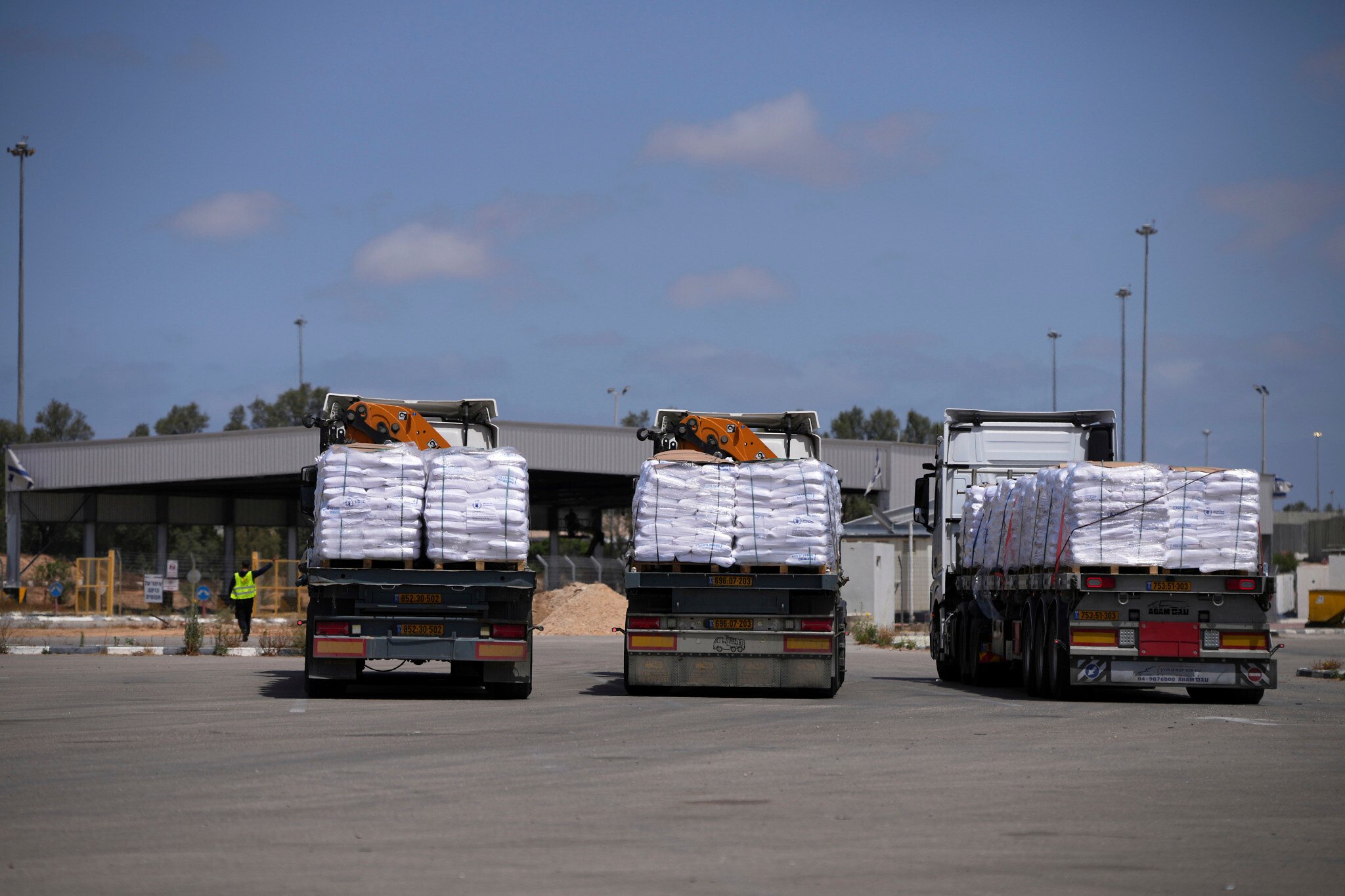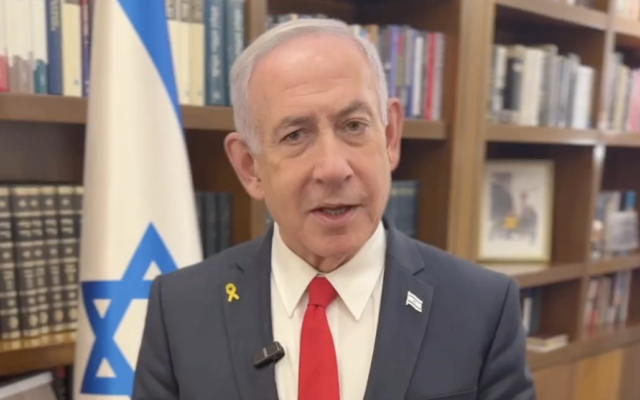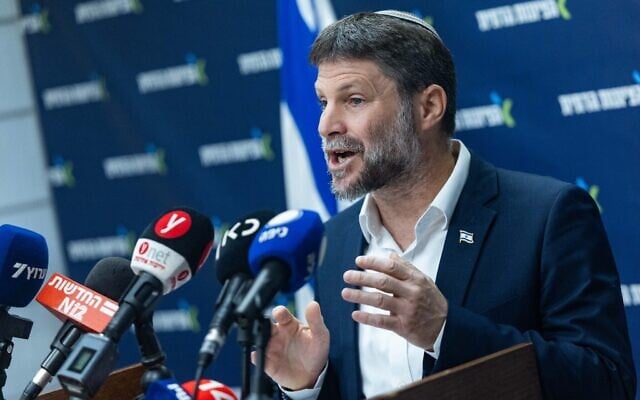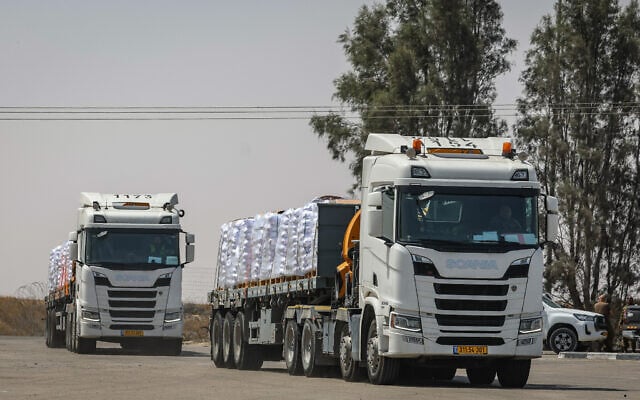



Prime Minister Benjamin Netanyahu on Monday defended his decision to allow limited humanitarian aid to enter the Gaza Strip, saying that pressure on Israel had been “approaching a red line.” The step was necessary in order to press ahead with the expanded military offensive against Hamas, he said, and had to begin despite the fact that IDF-secured distribution centers designed to keep the assistance out of the hands of the terror group were not yet ready.
However, right-wing politicians and groups assailed Netanyahu’s abrupt decision to resume aid to all parts of Gaza, which went against repeated pledges by top officials. There was criticism — but also support — from within Netanyahu’s ruling Likud party, while the far-right flank of his coalition was divided on the issue.
Though dozens of trucks carrying supplies were said to be ready to enter the Palestinian coastal enclave, it was not immediately clear how many would go in.
President Isaac Herzog praised the development, saying it would enable Israel to continue its military campaign in Gaza while maintaining “our humanity.” Meanwhile, far-right Finance Minister Bezalel Smotrich, who last month promised not to stay in the government “for a single minute” if any aid was brought to Gaza, backed down from the threat, claiming that the supplies would not reach Hamas. The theft of aid deliveries by the Palestinian terror group had been a key argument of his against renewing supplies.
In a video statement released on his personal Telegram channel, Netanyahu said that Israel’s allies had voiced concern about “images of hunger.”
Israel’s “greatest friends in the world,” he said, including senators but without mentioning specific nationalities, had said there was “one thing we cannot stand. We cannot accept images of hunger, mass hunger. We cannot stand that. We will not be able to support you.”
Netanyahu said the situation had been approaching a “red line” and a “dangerous point,” but it was not clear if he was referring to the crisis in Gaza or the potential loss of support from allies.
“Therefore, to achieve victory, we need to somehow solve the problem,” Netanyahu said.
Gaza has been devastated by the war, which was triggered on October 7, 2023, when Hamas led an invasion of southern Israel that killed 1,200 people, mostly civilians, and saw 251 abducted as hostages to Gaza. Terrorists in the Strip are still holding 58 hostages, 35 of whom have been confirmed dead by Israel.
Until new distribution centers are established under a US-backed plan to ensure aid doesn’t reach Hamas, the premier stated that Israel must provide minimal aid to the Strip in order to prevent mass starvation among the civilian population. The Gaza Humanitarian Fund, which has been set up to carry out the new aid plan, has said it will start its operation by the end of the month.
Palestinian media said 50 trucks carrying flour, cooking oil and legumes would be allowed into Gaza on Monday, while Israeli media said nine trucks with baby food were expected to enter during the afternoon. Emirati outlet The National outlet reported in the afternoon that three trucks had entered the Strip.
A Reuters reporter at the Kerem Shalom crossing from Israel into Gaza said no activity was visible by the late morning while UNRWA, the United Nations relief agency for Palestinians, said it would comment to the press “when and if aid goes in.”
Israel faces mounting international pressure over the blockade on humanitarian deliveries it imposed in March, when a two-month-old ceasefire collapsed and it renewed its offensive, with aid agencies warning of famine in the enclave of 2.3 million people. Jerusalem says the aid blockade is necessary to pressure Hamas to agree to release the hostages it is holding.
Tedros Adhanom Ghebreyesus, the head of the World Health Organization, said that two million people were starving in the Gaza Strip and warned “the risk of famine in Gaza is increasing with the deliberate withholding of humanitarian aid.”
Though Smotrich asserted that assistance going into Gaza would not reach Hamas, fellow far-right politician National Security Minister Itamar Ben Gvir panned the move as a “grave mistake.”
“This is not surrendering to pressure,” Smotrich said in a televised statement. “It is doing the right thing to continue to focus primarily on destroying Hamas. No aid is going to Hamas, period.”
Ben Gvir argued in a statement that “the prime minister is making a grave mistake with this move, which doesn’t even have a majority. We must crush Hamas and not simultaneously give it oxygen.”
In January, Ben Gvir’s Otzma Yehudit party quit the coalition over the previous Gaza ceasefire. The party returned in March as Israel resumed fighting. On Monday, Ben Gvir did not mention any thoughts of leaving again over the resumption of humanitarian supplies.
The Tikva Forum, which represents a hawkish group of families of hostages held in Gaza, said it was “shocked” by the decision. It urged Ben Gvir and Smotrich to work against the step.
Criticism also came from the ranks of Netanyahu’s own Likud party, with MK Avichai Boaron saying, “We mustn’t hand humanitarian aid to the enemy,” and MK Moshe Saada saying it “is an incorrect and immoral decision.”
Centrist leader Benny Gantz of the opposition accused Netanyahu of “hiding behind the IDF and the security establishment when making decisions that destabilize his coalition,” claiming the prime minister blames moves he doesn’t want to make on pressure from others, while taking the credit for those he sees as popular.
The right-wing Tzav 9 group, which has in the past blocked aid trucks en route to Gaza, called on its activists to resume those actions.
However, Foreign Minister Gideon Sa’ar defended the renewed entry of humanitarian aid, saying it was a necessary step to preserve international legitimacy and ensure continued support for Israel’s war effort.
A report from the Israel Hayom outlet claimed that the US had agreed to pressure Israel into resuming humanitarian aid to Gaza as part of an indirect arrangement in exchange for the release of Israeli-American soldier Edan Alexander last week, despite American claims that he was freed as a goodwill gesture.
According to the report, the deal, coordinated through contacts between American officials and senior Hamas figures, was the reason Israel was renewing aid deliveries into Hamas-controlled areas before the new distribution centers were ready.
The IDF has since expedited preparations for its revised distribution system, but in the meantime, supplies such as baby formula, medical equipment, fuel, and basic foodstuffs were being delivered using the same methods as in the past.
While international aid organizations are tasked with overseeing the distribution, Israeli officials acknowledged that Hamas is likely to divert a significant portion of the supplies.
Sources in Washington reportedly said the arrangement is intended as a temporary measure that secures continued US support for Israel’s military operation and will help facilitate progress in ceasefire and hostage release negotiations.



